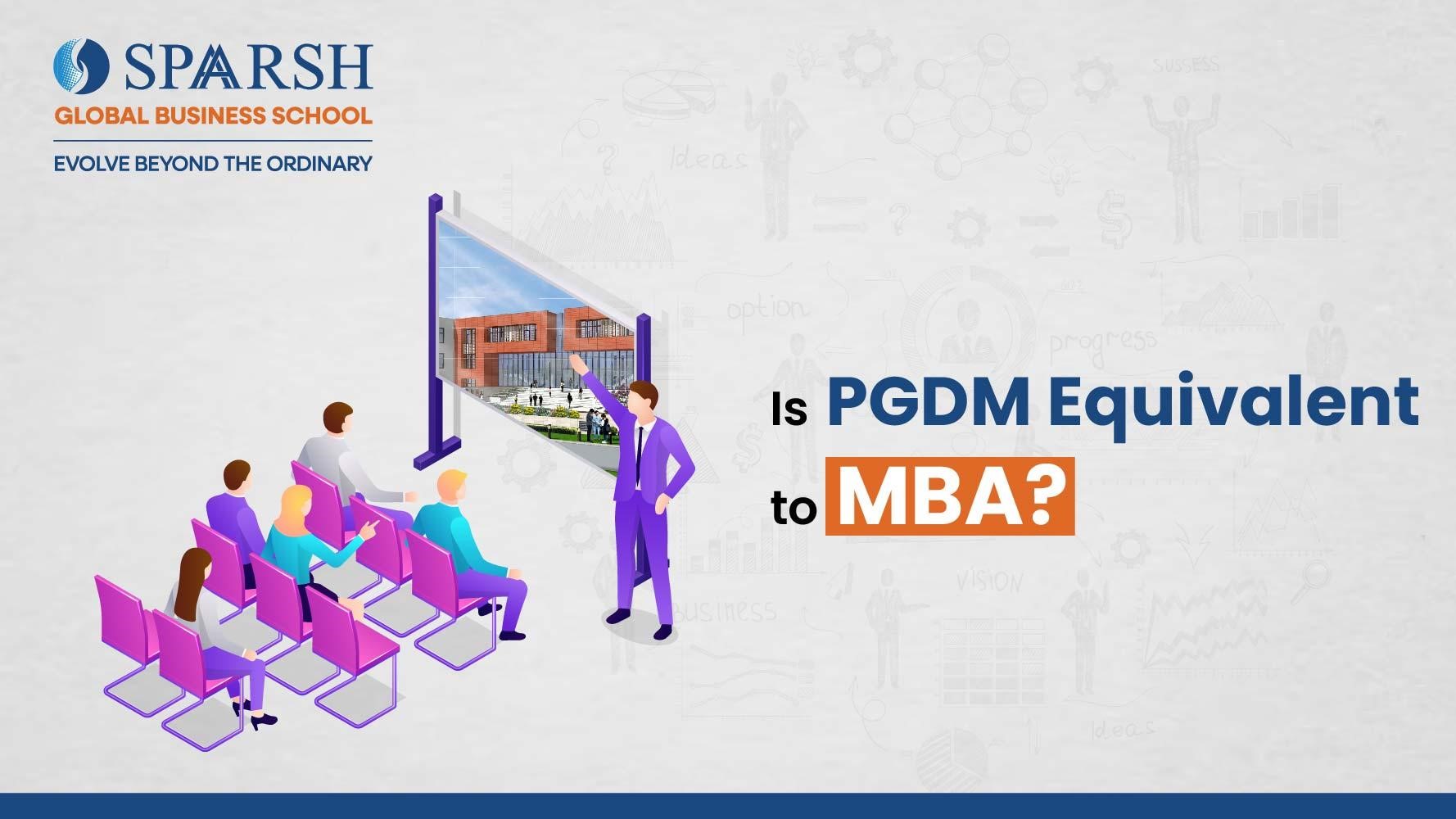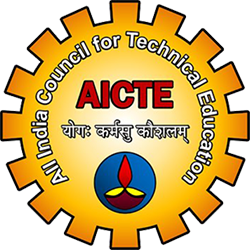Decoding the Equivalence: PGDM vs. MBA
The choice between pursuing a Post Graduate Diploma in Management (PGDM) or a Master of Business Administration (MBA) is a significant decision for individuals looking to further their education and enhance their career prospects in the field of business and management. Both programs offer valuable insights and skills, but they come with differences in terms of structure, curriculum, and institutional affiliations.
In this blog, we will explore the key distinctions between PGDM and MBA programs, helping you make an informed choice that aligns with your professional aspirations and educational preferences.

Comparative Analysis: PGDM and MBA Programs
So, is PGDM and MBA equivalent? Let's examine the distinctions:
| Factors | PGDM | MBA |
|
Program Type |
Post Graduate Diploma in Management (PGDM) | Master of Business Administration (MBA) |
| Duration | 2 years | 2 years |
| Curriculum | Design flexible curriculum adaptable to industry demands with application-based learning. | The curriculum is more theoretical,standardized and rigid. |
| Institutional Affiliation | Typically provided by autonomous, non-affiliated institutions. | Offered by universities or business schools. |
| Accreditation | Approved and Recognised by AICTE and other relevant bodies. | Accredited by AICTE, UGC, and global accreditation bodies. |
| Specializations | Offers diverse specializations to meet industry demands based on choice based credit system | Specializations in MBA include Finance, Marketing, Human Resources, and more. |
| Pedagogy | Multi-dimensional teaching pedagogy which emphasizes practical, industry-oriented learning with case studies,simulation games,live projects, and internships. | Combines theory and practice with limited scope as syllabus prepared by University. |
| Faculty Qualifications | Well qualified experienced academicians with industry exposure. | Faculty members are from academic background. |
| Global Recognition | International exposure which leads to intercultural dimension to face real life challenges and networking. Gives them a better understanding of the global marketplace. | May not be widely recognised, although this varies institute to institute. |
| Autonomy of Institutions | Institutions can design and adapt programs independently. | Universities often have standardized, less flexible programs. |
| Job Prospects | Job prospects vary based on the institution's reputation and connections. Most PGDM institutions have better placement record than MBA. | Usually provides strong job placement with top company relationships. |
A Closer Look at PGDM
For many professionals looking to pursue an advancement in their management education, PGDM is one of the most opted courses. Now, let’s go into the realm of PGDM:
1. What is a PGDM?
The Post Graduate Diploma in Management (PGDM) is an advanced program in business and management. Its main focus is to give students the basic skills, competence and proficiency needed to take commanding positions in the corporate world. The PGDM curriculum often encompasses a broad spectrum of business disciplines, spanning finance, marketing, human resources, operations, and various other areas. This versatile qualification paves the way for a multitude of career prospects.
2. PGDM Accreditation and Recognition
Management Institutes and Universities undertake approval or accreditation to demonstrate their commitment to providing high-quality education and meeting national standards. In comparison, recognition is granted by governments or other relevant organisations to ensure that a PGDM programs or University's degrees or qualifications are recognised internationally.
3. Specializations in PGDM
Opting for the ideal specialization is a momentous choice since it moulds the course of a student's career within a distinct field. PGDM programs offer a diverse range of specializations, giving students the flexibility to select an area that aligns with their career goals and aspirations. These specializations encompass traditional areas like finance, marketing, and human resources, as well as contemporary fields such as data analytics, entrepreneurship, and international business. Therefore, it's crucial to meticulously assess your interests and professional goals when making a selection from the diverse specializations available within the PGDM program.
A Closer Look at MBA
Numerous professionals seeking to advance their management education often opt for an MBA program. But what does an MBA entail? Read to know more.
1. What is an MBA?
An MBA is a postgraduate degree program that focuses on various aspects of business and management. It is designed to equip students with a comprehensive understanding of business concepts, leadership skills, and critical thinking abilities. MBA programs typically cover subjects like finance, marketing, human resources, operations, strategy, and more. They are highly regarded for preparing individuals for leadership roles in the corporate world and providing a broad foundation in business knowledge.
2. MBA Accreditation and Recognition
Accreditation and recognition of MBA programs are critical aspects of their quality and validity. Some accreditation by relevant bodies are the Association to Advance Collegiate Schools of Business (AACSB), the Accreditation Council for Business Schools and Programs (ACBSP), and the European Quality Improvement System (EQUIS). Accreditation ensures that a program meets established educational standards and is recognized for its quality. MBA programs offered by accredited institutions are generally well-regarded and may provide better career opportunities.
3. Specializations in MBA
MBA programs often offer a range of specializations allowing students to focus on specific areas of business. Some specializations that allow students to delve deeply into specific business areas, such as finance, marketing, human resources, data analytics, IB, operations, or entrepreneurship.
Key Differences Between PGDM and MBA
In India, two of the most well-liked postgraduate management programs are the PGDM and the MBA. Both programs give students the chance to acquire the abilities and expertise necessary for professional growth. The PGDM and MBA programs do, however, have some significant distinctions.
- Autonomy of Institutions
The independence of the universities that offer PGDM and MBA programs is one of their primary distinctions. University-based MBA programs are more common, whereas independent organizations like management universities and business schools provide PGDM programs. This implies that PGDM programs have more freedom to tailor their curriculum and pedagogical approaches to the demands of the sector.
- Curriculum and Course Structure
PGDM programs typically have a more practical and industry-oriented curriculum than MBA programs. This is because PGDM programs are often designed in consultation with industry experts to ensure that students are learning the skills and knowledge that are most in demand. MBA programs, on the other hand, typically have a more theoretical and academic focus.
- Faculty and Pedagogy
MBA programs may place more emphasis on traditional classroom teaching methods, such as lectures and examinations. They tend to follow a structured, academic approach. Whereas, PGDM programs may use various teaching methods, including case studies, industry interactions, and practical exposure. They often have a stronger focus on bridging the gap between theory and practice.
- Industry Connections
Both MBA and PGDM programs offer industry connections, but the nature of these connections can differ significantly. MBA programs may provide access to hands-on connections within specific industries, whereas PGDM programs tend to focus on tailored, hands-on connections within specific industries.
- Duration and Flexibility
The key differentiation between MBA and PGDM programs lies in the program length and curriculum flexibility. MBA programs typically span two years with a fixed curriculum, emphasizing academic theory. In contrast, PGDM programs offer flexible durations (ranging from one to two years) and adaptable curricula that respond to industry needs, focusing on practical, real-world applications.
- Recognition and Accreditation
Recognition and accreditation are important factors to consider when choosing a PGDM or MBA program. Accredited programs have met certain standards of quality, as set by a recognized accrediting body. This ensures that students receive a high-quality education and that their degree is recognized by employers. In India, the All India Council for Technical Education (AICTE) is responsible for accrediting PGDM programs. The University Grants Commission (UGC) is responsible for accrediting MBA programs.
In addition to national accreditation, some PGDM and MBA programs are also accredited by international accrediting bodies. Some of the global recognition and accreditation bodies are:
| Recognition and Accreditation Body | Significance |
| AACSB (Association to Advance Collegiate Schools of Business), United States | Renowned international certification for business education. |
| AMBA (Association of MBAs), UK | Leading accreditation agency for MBA programs that has a focus on excellence. |
| EQUIS (European Quality Improvement System), Europe | Highly regarded for the caliber of its worldwide business education. |
| ACBSP (Accreditation Council for Business Schools and Programs), United States | Places a focus on teaching quality while accrediting PGDM and MBA programs. |
| UGC (University Grants Commission), India | The UGC in India grants higher education institutions accreditation and approval. |
Career Opportunities and Employability
Job Prospects with PGDM
PGDM graduates are in high demand by employers in India and abroad as they are industry-oriented, provides better practical exposure. There are a lot of job opportunities for PGDM professionals spread across different fields such as Banking and Finance, Consulting, FMCG, IT and Manufacturing. According to a recent survey by the Association of Indian Management Schools (AIMS), 90% of PGDM graduates were placed within three months of post-graduation.
Some of the most common job roles for PGDM graduates include:
- Marketing Manager
- Human Resources Manager
- Sales Manager
- Business Consultant
- Brand Manager
- Strategic Manager
- Operations Manager
- Management Consultant
- Investment Banker
- International Sales Manager
Job Prospects with MBA
MBA graduates also have equal scope for placements in India and abroad. They also have a wide range of job opportunities in a variety of industries. According to a recent Graduate Management Admission Council (GMAC survey), 95% of MBA graduates from Indian business schools were placed within three months of post-graduation.
Some of the most common job roles for MBA graduates include:
- Human Resources Manager
- Operations Manager
- Marketing Manager
- Management Consultant
- Investment Banker
- Product Manager
- Sales Manager
Graduates of the PGDM and MBA programs can expect a range of salaries and career opportunities depending on their industry, employment, and role. However, graduates of both the PGDM and MBA programs often earn well and have promising prospects.
According to PayScale, the average salary for PGDM graduates in India is INR 7.6 lakhs per annum. The average salary for MBA graduates in India is INR 7.7 lakhs per annum.
PGDM vs. MBA: Making the Right Choice
Choosing between a PGDM and an MBA is a significant decision that can impact your career trajectory.
Both PGDM and MBA programs are excellent options for students interested in pursuing a business career. The best program for you will depend on your individual needs and goals. If you are looking for a program that is more practical and industry-oriented, then a PGDM program may be a better fit for you. If you are looking for a program that has a more theoretical and academic focus, then an MBA program may be a better fit for you.
Conclusion
The decision between a PGDM and an MBA affects both your academic and professional trajectory in today's constantly changing business education environment. You may make an informed decision that fits your aims and aspirations by taking into account aspects like program structure, specializations, faculty competence, industry associations, and adaptability.
Explore Sparsh Global Business School’s PGDM offerings if you're considering your PGDM options to find a world of opportunities for your management education. Sparsh Global Business School’s dedication to excellence, wide range of specializations, industry partnerships, and academic flexibility make sure you're ready for the possibilities and challenges that await you in both your academic and professional lives.
Learn More About Sparsh Global Business School’s PGDM Offerings!
The Centre for EBC at Sparsh Global Business School is a cutting-edge hub that collaborates with global leaders to offer courses covering the fast-changing landscape of New-Gen Business Management and technology. Under the Center for EBC, Sparsh Global Business School offers two types of interventions: Value-Add and Employability Enrichment.
These interventions cover contemporary topics in partnership with academic bodies, policymakers, industry associations, and think tanks. They include Industry Certifications from top consultancies like 'Bloomberg,' 'Six Sigma,' and 'HR Analytics' to enhance employability and placement prospects.
SGBS is a forward-thinking business school that fosters global, environmentally conscious leaders. It provides an Entrepreneurship Lab called Sparsh Combinator with a dedicated seed fund. All PGDM students, especially those in Entrepreneurship & Innovation, have access to this fund to explore startup ventures. The goal is to drive social change by encouraging sustainable business models that address critical societal challenges. To learn more about Sparsh Global Business School’s PGDM offerings, visit the website.



